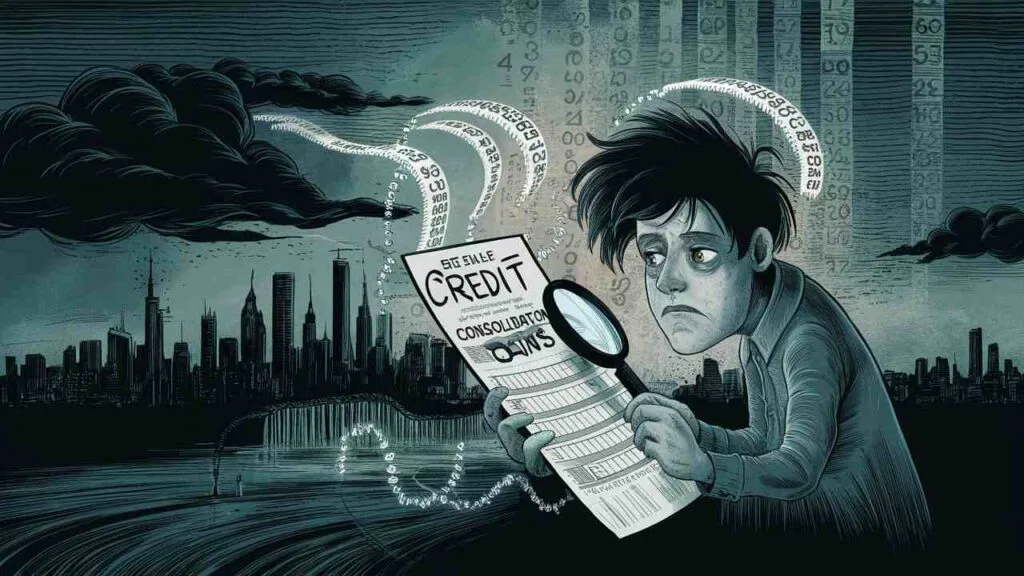Introduction: The Credit Score Conundrum
Navigating the labyrinth of personal finance can be as bewildering as trying to find a needle in a haystack. Consolidation loans are often touted as a golden ticket out of the financial mire, but do they come with hidden pitfalls that could hurt your credit score? Understanding the dual nature of these loans is crucial to making a decision that won’t leave you with a larger mess than you started with.

Understanding Consolidation Loans: A Quick Overview
Debt consolidation loans bundle multiple debts into a single loan with a new interest rate and repayment term. Think of it as combining all your disparate financial obligations into one neat, tidy package. It’s like clearing out your cluttered desk and putting everything into a shiny new drawer. The goal? Simplify your life and potentially lower your monthly payments.
Why Credit Scores Matter in the First Place
Your credit score is like a financial report card, showing lenders how responsible you are with borrowing and repaying money. It’s not just a number; it’s a key that unlocks doors to better interest rates, higher credit limits, and, of course, that coveted loan approval. A high credit score can save you a fortune, while a low score might leave you facing higher rates and fewer options.
How Consolidation Loans Impact Your Credit
The Initial Hit: What Happens When You Apply
Applying for a consolidation loan is akin to making a grand entrance at a party – it’s a big deal. A hard inquiry, or credit check, occurs when you apply, which can momentarily dip your credit score. This is because it suggests you’re actively seeking new credit, which can be a red flag to potential lenders. However, this dip is usually short-lived and can be mitigated with careful financial management.
Credit Utilization Ratio: The Balancing Act
Credit utilization – the ratio of your current credit card balances to your credit limits – plays a starring role in your credit score. When you use a consolidation loan to pay off high credit card balances, your utilization ratio improves, which can positively impact your score. Imagine it as a balancing act: lower balances mean a healthier credit profile.

The Role of Payment History: Consistency Is Key
Your payment history is the bedrock of your credit score. On-time payments boost your creditworthiness, while missed or late payments can be detrimental. With a consolidation loan, you consolidate your debts and, ideally, simplify your payments. If you keep up with your new loan’s payments, you’ll likely see your score benefit from a cleaner payment record.
Short-Term Effects on Your Credit Score
The Impact of a Hard Inquiry: Does It Really Hurt?
A hard inquiry is the temporary damage you might feel when a lender checks your credit report. It’s like a brief scratch on an otherwise pristine surface. While it can lower your credit score slightly, this effect typically fades as long as you manage your new loan responsibly.
How New Credit Lines Can Temporarily Lower Your Score
Opening a new credit line, like a consolidation loan, can initially reduce your credit score. This happens because you’re adding new debt to your profile and the hard inquiry affects your score. However, over time, as you manage the loan well, your score should rebound and potentially improve as you demonstrate good credit behavior.
Immediate Benefits: Paying Off High-Interest Debt
The silver lining of a consolidation loan is its potential to pay off high-interest debt, which can offer immediate financial relief. By swapping high-interest debts for a single, lower-interest loan, you save on interest and simplify your financial obligations, which can be a boon to your credit score if managed properly.

Long-Term Effects on Your Credit Score
Building Credit with On-Time Payments
Consistency in payments is like a gentle breeze propelling you forward on the road to good credit. As you make on-time payments on your consolidation loan, you gradually rebuild and potentially improve your credit score. This steady behavior signals to lenders that you’re a reliable borrower.
Reducing Credit Utilization Over Time
As you pay down your consolidation loan, your credit utilization ratio – the percentage of available credit you’re using – decreases. Lower utilization often translates to a healthier credit score, as it shows that you’re managing your credit responsibly and not overextending yourself.
The Snowball Effect: How Long-Term Gains Outweigh Short-Term Losses
Think of the snowball effect: a small push can lead to a massive impact. Initially, your credit score might dip, but over time, as you pay down debt and maintain a positive payment history, you’ll likely see significant improvements. Patience and perseverance are key to turning short-term losses into long-term gains.
Comparing Consolidation Loans to Other Debt Solutions
Debt Settlement vs. Debt Consolidation: Which Is Worse for Your Credit?
Debt settlement involves negotiating with creditors to pay less than what you owe, which can severely impact your credit score. In contrast, consolidation loans aim to simplify and potentially reduce interest without directly affecting the amount owed. Consolidation generally has a less severe impact compared to settlement, making it a preferable option for many.
Balance Transfers vs. Consolidation Loans: A Credit Score Showdown
Balance transfers involve moving debt from high-interest credit cards to a new card with a lower rate, which can temporarily boost your score if managed well. However, consolidation loans offer a more comprehensive approach by merging multiple debts into one, which can be more effective for long-term financial health.
DIY Debt Repayment: The Impact on Your Credit
DIY debt repayment strategies, like the snowball or avalanche methods, involve paying off debts systematically without taking out a new loan. While these methods can improve your credit score over time, they require significant discipline and may not offer the immediate relief that consolidation loans can provide.
Common Myths About Consolidation Loans and Credit Scores
Myth: Consolidation Loans Always Lower Your Credit Score
Contrary to popular belief, consolidation loans don’t always lower your credit score. While there might be a slight dip initially due to a hard inquiry and new credit line, responsible management of the loan can lead to score improvements over time.
Myth: It’s Better to Close All Credit Cards After Consolidation
Closing all credit cards post-consolidation can negatively affect your credit score by reducing your credit utilization ratio and shortening your credit history. Keeping old accounts open, even with a zero balance, can help maintain a favorable credit profile.
Myth: You Should Avoid Applying for Any New Credit
Avoiding new credit altogether is a misconception. While multiple credit inquiries can impact your score, a well-managed consolidation loan can improve your credit over time. It’s essential to strike a balance between maintaining good credit habits and managing new credit opportunities.
Tips to Minimize Credit Damage During Consolidation
Timing Matters: When to Apply for a Consolidation Loan
Choosing the right time to apply for a consolidation loan can help minimize its impact on your credit score. Aim to apply when you have a stable financial situation and can commit to making consistent payments, which can help mitigate any temporary dips in your score.
Keeping Old Accounts Open: The Age of Credit History
Maintaining your old credit accounts, even with zero balances, helps preserve your credit history’s length, which is beneficial for your credit score. The age of your credit accounts contributes to your overall credit profile, so don’t be quick to close accounts after consolidation.
Monitoring Your Credit Score Throughout the Process
Regularly checking your credit score during and after the consolidation process can help you stay on top of any changes. Use credit monitoring tools to track your score and ensure that your consolidation loan is positively impacting your financial health.
Real-Life Scenarios: How Consolidation Loans Affect Different Credit Profiles
High Credit Score Borrowers: What to Expect
For those with high credit scores, a consolidation loan might cause only a minor and temporary dip. As long as the borrower continues to make timely payments, their score is likely to rebound and potentially improve due to lower credit utilization.
Mid-Range Credit Score Borrowers: The Pros and Cons
Borrowers with mid-range credit scores may experience a more noticeable dip initially, but responsible management of the consolidation loan can lead to improvements over time. The loan can help manage debt more effectively and gradually improve the score.
Low Credit Score Borrowers: Is Consolidation Worth It?
For those with low credit scores, a consolidation loan might be a mixed blessing. While it can provide immediate relief by simplifying debt and potentially lowering interest rates, careful management is essential to avoid exacerbating the credit issues.
The Psychology of Credit and Debt Consolidation
How Fear of Credit Damage Can Lead to Inaction
Fear of damaging your credit score can be paralyzing, leading some to avoid necessary financial steps like debt consolidation. Understanding the potential benefits and risks can help alleviate this fear and encourage proactive financial management.
The Emotional Relief of a Simplified Debt Payment Plan
Consolidation loans can offer significant emotional relief by streamlining debt payments and reducing the burden of managing multiple creditors. This simplification can contribute to better financial habits and a more positive outlook on debt management.
Why Understanding the Impact on Credit Helps You Make Better Choices
Grasping how consolidation loans affect your credit score enables you to make informed decisions and avoid pitfalls. Knowledge empowers you to manage your finances more effectively and choose the best strategies for improving your credit health. source
Tools and Resources to Track Your Credit Score
Best Credit Monitoring Services for Loan Applicants
Utilize top credit monitoring services to keep an eye on your credit score and report. These tools provide insights into how your consolidation loan impacts your credit and help you stay on track with your financial goals.
Apps to Help You Manage Your Debt and Credit
Various apps can assist in managing debt and monitoring credit. These tools offer features like budgeting, debt tracking, and credit score monitoring, making it easier to handle your finances and stay informed.
How to Read Your Credit Report: What Lenders See
Understanding your credit report is crucial for managing your credit score. Learn how to interpret the information lenders see, including your payment history, credit utilization, and account details, to make better financial decisions.
BOTTOM LINE: Making an Informed Decision
Weighing the Benefits vs. Potential Credit Damage
Before committing to a consolidation loan, weigh the immediate credit score impacts against the long-term benefits. Consider how consolidation might simplify your finances and improve your credit health over time.
How to Know If a Consolidation Loan Is Right for You
Assess whether a consolidation loan aligns with your financial situation and goals. Evaluate the potential benefits, such as lower interest rates and simplified payments, against the possible temporary credit score dip.
Final Thoughts: Protecting Your Credit While Managing Debt
Balancing effective debt management with protecting your credit score is key. Use consolidation loans wisely, maintain good financial habits, and keep informed to navigate your path to financial stability successfully.
Frequently Asked Questions (FAQs)
Can I Still Use My Credit Card After Debt Consolidation?
Yes, you can still use your credit card after debt consolidation. However, it’s crucial to manage your credit cards wisely to avoid accumulating more debt. Keeping balances low and making timely payments helps ensure that your consolidation efforts remain effective and your credit score improves.
Read More about: Can I Still Use My Credit Card After Debt Consolidation?
Do Banks Offer Debt Consolidation?
Yes, banks do offer debt consolidation options. They provide various products like personal loans and balance transfer credit cards that can help consolidate multiple debts into a single loan with potentially lower interest rates. It’s advisable to compare offers and terms from different banks to find the best fit for your financial situation.
Read More about: Do Banks Offer Debt Consolidation?
What Score Do You Need to Consolidate Debt?
Typically, a credit score of 650 or higher is recommended for qualifying for favorable debt consolidation loans. However, many lenders offer options for those with lower scores, although terms might be less favorable. A higher score generally means better interest rates and loan terms.
Read More about: What Score Do You Need to Consolidate Debt?
Who Is the Best Debt Consolidation Company?
Determining the best debt consolidation company depends on your specific needs and financial situation. Companies with strong reputations, positive customer reviews, and competitive terms include National Debt Relief, Freedom Debt Relief, and SoFi. Always research and compare before making a decision.
Read More about: Who Is the Best Debt Consolidation Company?
How Quickly Does Debt Consolidation Work?
Debt consolidation can start showing results relatively quickly, with immediate benefits such as simplified payments and reduced interest rates. However, the full impact on your financial situation and credit score may take several months as you make consistent payments and reduce your overall debt.
Read More about: How Quickly Does Debt Consolidation Work?
How Much Does It Cost to Consolidate Your Debt?
The cost to consolidate debt varies depending on the method and lender. Fees can include loan origination fees, balance transfer fees, and interest rates. It’s essential to review all associated costs and compare them to the potential savings on interest to determine if consolidation is cost-effective.
Read More about: How Much Does It Cost to Consolidate Your Debt?
How Can I Consolidate All My Debts Into One?
To consolidate all your debts into one, you can use methods such as taking out a debt consolidation loan, transferring balances to a single credit card with a lower interest rate, or using a personal loan. Evaluate the options based on interest rates, fees, and terms to choose the best strategy for your situation.
Read More about: How Can I Consolidate All My Debts Into One?
Can I Consolidate My Debt with Bad Credit?
Yes, it is possible to consolidate debt with bad credit, though the options may be limited and come with higher interest rates. Secured loans or credit cards designed for individuals with poor credit may be available, but improving your credit score beforehand can increase your chances of getting better terms.
Read More about: Can I Consolidate My Debt with Bad Credit?
How to Consolidate Debt Without a Loan?
Debt can be consolidated without taking out a new loan by using balance transfer credit cards, negotiating with creditors for lower interest rates, or enrolling in a debt management plan with a credit counseling agency. These methods can help you manage and reduce debt without incurring additional loans.
Read More about: How to Consolidate Debt Without a Loan?
Are Consolidation Loans Hard to Get?
Consolidation loans can be challenging to obtain for individuals with poor credit or high levels of existing debt. Lenders typically look for a good credit score, stable income, and manageable debt levels. However, options are available for those with less-than-ideal credit, though terms might be less favorable.
Read More about: Are Consolidation Loans Hard to Get?









